Strike strikes hard
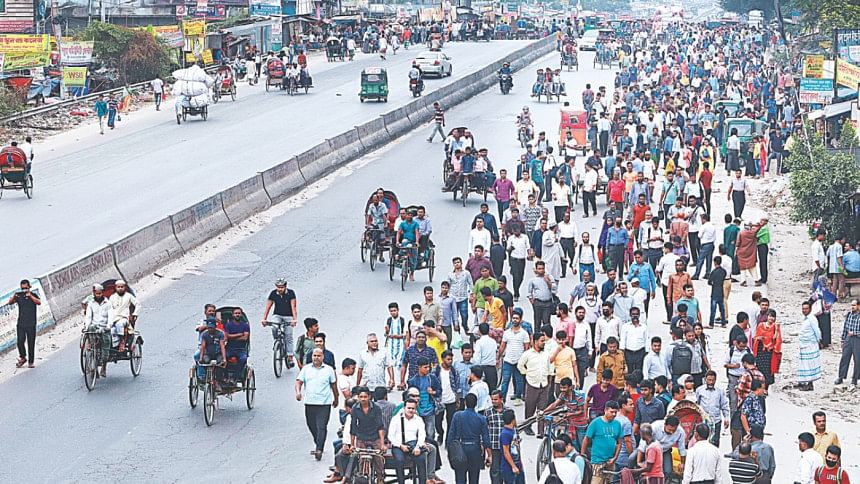
Road transport workers yesterday virtually held the countrymen hostage as they began a 48-hour strike to force the government to bring amendments to the recently passed Road Transport Act-2018, practically cutting off the capital from the rest of the country.
Commuters underwent untold sufferings with the road communications all over the country falling apart amid the work stoppage enforced by Shipping Minister Shajahan Khan-led Bangladesh Road Transport Workers Federation.
No long-route bus operated to and from the capital. In the morning, people woke up in a city where no public transport was available as private buses, minibuses and even human hauliers were kept off the streets.
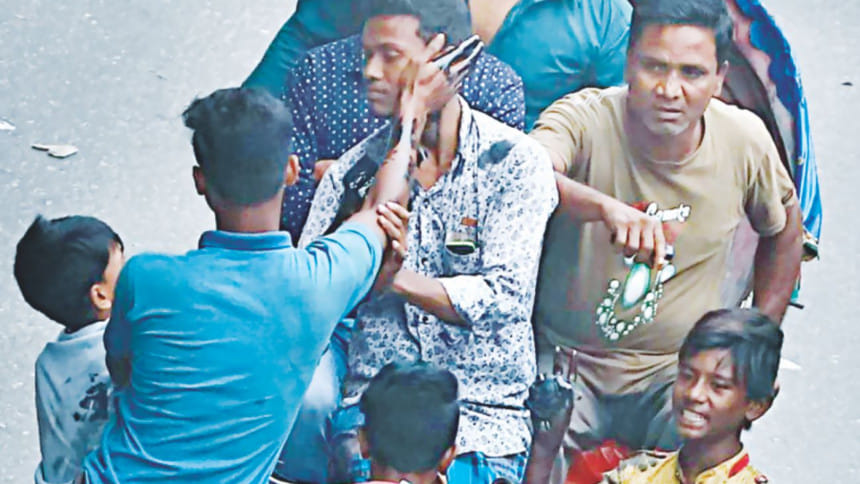
Many office-goers and students had to walk to their destinations. Bus terminals in the capital were teeming with commuters waiting for buses but in vain.
Rickshaws dominated the city roads with the pullers and drivers of CNG-run auto-rickshaws charging extra fares. Of the buses, only those of government-run BRTC operated in the capital.
Starting the strike from 6:00am, the transport workers also obstructed private cars, CNG-run three wheelers, motorcycles and even ambulances at different places in the city and elsewhere.
What was worse, they smeared used engine oil on the faces of some drivers in the capital's Jatrabari and passengers including female students in Narayanganj.
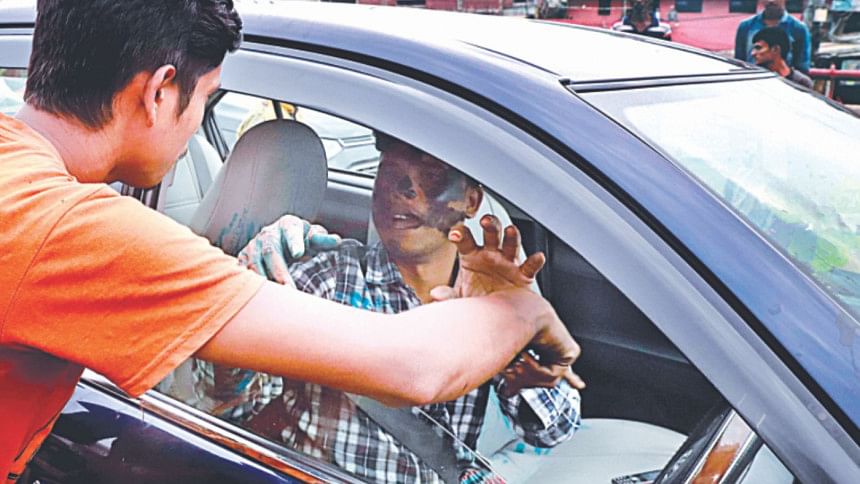
Many owners of private vehicles opted to stay off the roads in fear of getting into trouble. People, however, turned to social media to express their fury and criticised the role of the shipping minister, who is the executive president of the federation.
The workers obstructed buses that defied the strike in Jhenidah, Tangail, Bogura, Nilphamari and Thakurgaon.
Several hundred passengers, coming from India, got stuck at Benapole land port while 200 trucks carrying imported goods were trapped at Bhomra port. Transportation of vegetables from different districts to Dhaka was disrupted and traders apprehended a price hike.
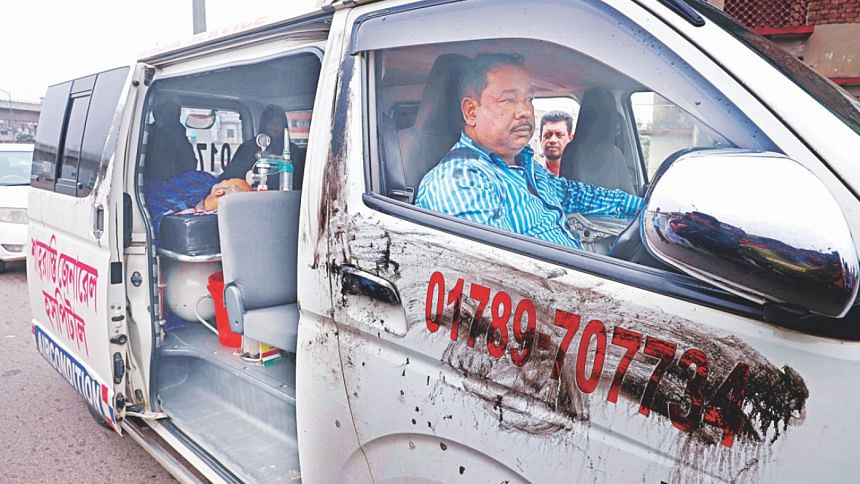
Candidates seeking admission to Chittagong University bore the brunt of the situation on their way to the port city from different districts as the CU authorities are hell bent on holding the "A" unit test today despite the crisis.
Leaders of the federation on Saturday called the work stoppage from a rally in front of the Jatiya Press Club to press home their eight-point demand.
The demands include making all offences under the Road Transport Act bailable, scrapping the provision for the fine of Tk 5 lakh on a worker for involvement in a road accident, changing the minimum educational qualification required to obtain driving licences from class-VIII to class-V, and ending harassment by police on roads.
The Daily Star could not reach the shipping minister over phone. He didn't reply to the text message sent by this correspondent last night.
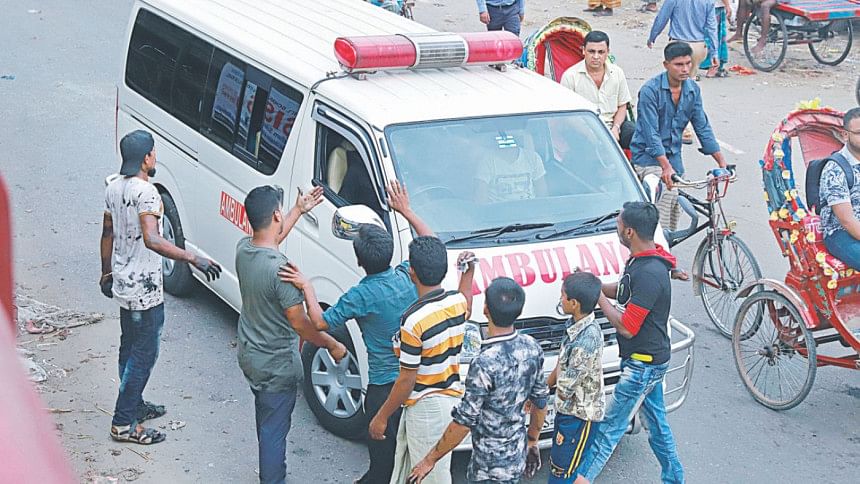
Earlier in the day, he refused to make any comment when journalists at the secretariat questioned him about the strike.
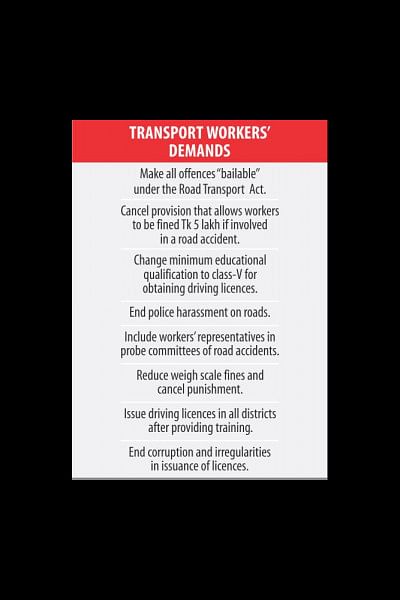
'WHY PEOPLE WILL BE HELD HOSTAGE?'
Fifteen-year-old Hanufa, a madrasa student from Haluaghat of Mymensingh, had undergone a tonsil operation at Dhaka Medical College Hospital on Saturday.
Unaware of the strike, she and her parents arrived at Mohakhali Bus Terminal around 10:00am to leave for Mymensingh.
"We came to know about the strike after reaching here. We don't know how we will go home," her mother Shamsunnahar told this newspaper around noon.
Nur Muhammad Mithu, a private service holder, was trying to catch whatever he could get at Jatrabari to reach Cumilla's Chauddagram to attend the funeral of his uncle.
He got a CNG-run auto-rickshaw that agreed to take him up to Kanchpur bridge. But the transport workers obstructed the auto-rickshaw and humiliated the driver, he told The Daily Star.
"I tried to persuade them to allow me to go saying my uncle died last night. But nothing worked," he said.
A heartbroken Nur, wrote in a Facebook post, "I will remember my entire life those people for whom I could not see my uncle for the last time."
Pradip Kumar Roy and eight other farmers from Lalmonirhat on Saturday evening started for Munshiganj. After reaching Gazipur bypass yesterday morning, they were asked to get down from their bus.
Then they walked to Uttara and took auto-rickshaws to get to Mohakhali Bus Terminal spending Tk 70 per person.
"We've to go to Munshiganj but don't know how it will be possible," Pradip said.
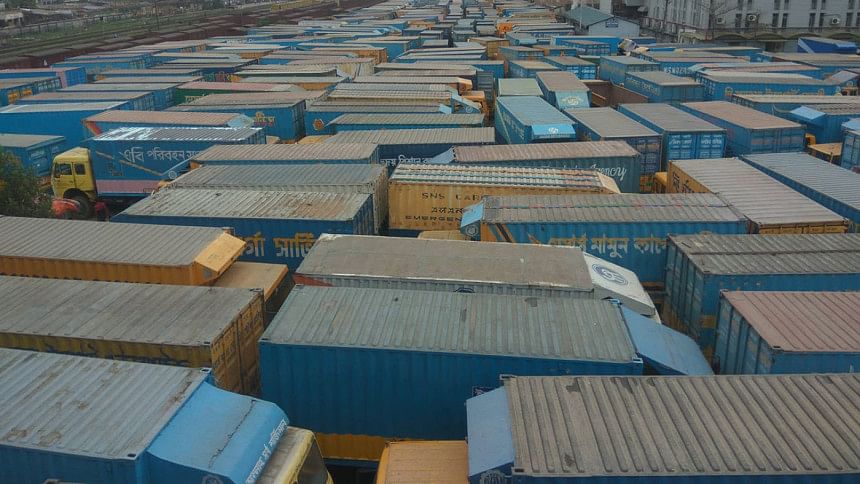
Maksudur Rahman, a resident of Mohammadpur, who struggled to reach the DMCH, asked, “What's our fault? Why the people will always be held hostage?"
Long route and inter-city buses were seen parked at Gabtoli, Mohakhali and Sayedabad terminals. Many people with luggage were seen waiting for buses and some were going back.
Siddiqur Rahman, president of Bangladesh Garment Manufacturers and Exporters Association (BGMEA), said the export is being hampered badly as they cannot carry their goods to the port.
"Our export target is $40 billion. This target will not be achieved if such a strike goes on unabated," he told The Daily Star. He urged the government to take immediate steps for a permanent solution.
'IT'S THEIR OLD TRICK'
On Facebook, a number of people criticised the workers and the shipping minister for the strike.
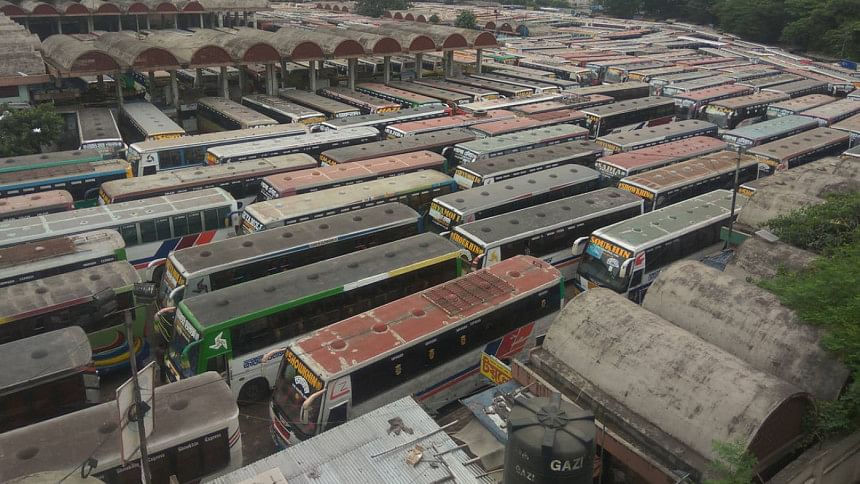
"A transport strike called by a minister is continuing across the country. Why was the strike called and against whom? The game of holding people hostage to realise demands is something old. We want an end to this game," Probhash Amin, a senior journalist, wrote in his Facebook wall.
Road safety campaigners too observed that transport workers making people suffer to have their demands realised is nothing new.
"They hold people hostage to serve own interests and show the government their strength. It's their old trick," said Mozammel Hoque Chowdhury, secretary general of Bangladesh Jatri Kalyan Samity.
In March last year, they called similar strike protesting the verdicts of two courts, bringing the country to a standstill.
The strike began initially in 10 southern districts under Khulna division, protesting a verdict that gave life sentence to a bus driver over the deaths of filmmaker Tareque Masud, media personality Ashfaque Munier Mishuk and three others in an accident in 2011.
The following day, transport workers extended the strike to other parts of the country without any formal announcement after a Dhaka court sentenced a truck driver to death over the killing of a woman in a 2003 accident in Savar.
During the student agitations for safe roads in August, transport owners and workers stopped their services as many of them were sued for not having legal documents.
MINISTER REQUESTS, WORKERS REJECT
Meanwhile, Road Transport and Bridges Minister Obaidul Quader urged the transport workers to withdraw their work stoppage considering public sufferings.
Talking to reporters at Setu Bhaban, he reiterated that there is no scope for amending the act now in this parliament and if their demands are rational, the next parliament and the government will consider those.
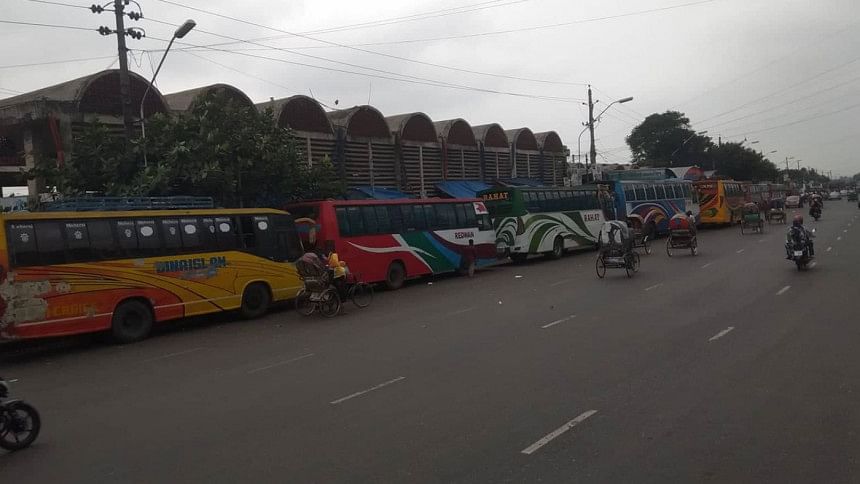
Osman Ali, general secretary of the transport federation, however, turned down Quader's request, saying, "It is not possible."
He said they submitted their demands to the minister on September 27 and the issues could have been discussed then.
"The government could have told us to wait for the next parliament … Now it is not possible for us to respond to the minister's request.”
About the public sufferings, Osman said they had nothing to do but to apologise to people. "It is not possible for us to drive vehicles with the law in place."
He further said they are not holding people hostage as they informed the government about their decision to enforce the work stoppage a month ago.
Asked whether Shipping Minister Shajahan had consented to their decision, Osman on Thursday told The Daily Star, “There was no scope for opposing the decision taken by the central committee.”
However, another top leader of the federation confirmed that the minister gave consent to the work stoppage.
Also yesterday, Law Minister Anisul Huq said those who are enforcing the strike without knowing the law properly and urged the workers to withdraw it.
THEY WERE INVOLVED IN THE PROCESS
In March last year, the cabinet approved in principle the proposed Road Transport Act. It, however, remained shelved at the law ministry for more than a year for vetting amid opposition from transport owners and workers to some of its provisions.
In the meantime, the government held around a dozen of meetings with transport leaders before finalising the draft, sources said.
The government decided to place the draft before the cabinet amid the student agitations for road safety following the death of two college students in the capital on July 29.
The cabinet passed the final draft on August 6 and parliament on September 19 passed the bill with the road safety campaigners decrying lenient punishment for deaths caused by reckless driving.
Sources say Shajahan was present at the August 6 meeting of the cabinet that okayed the final draft.
Mozammel Hoque said transport leaders were directly involved with the law making process, and being a minister, Shajahan had exerted influence in favour of the workers' demands.
"Their 98 percent demands were met in the law and now they are inflicting sufferings upon people for realising the rest 2 percent demands. This is unacceptable and unethical," he said.
Osman Ali, however, said the law was not enacted as per the discussion they had with the government.
Asked why they did not protest before the passage of the bill, he claimed they raised their concern at the meeting of parliamentary standing committee and authority concerned.
"We had to go for work stoppage as they did not pay heed to our demands,” he added.

 For all latest news, follow The Daily Star's Google News channel.
For all latest news, follow The Daily Star's Google News channel. 


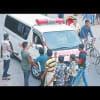





Comments